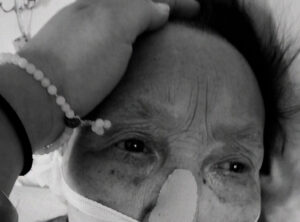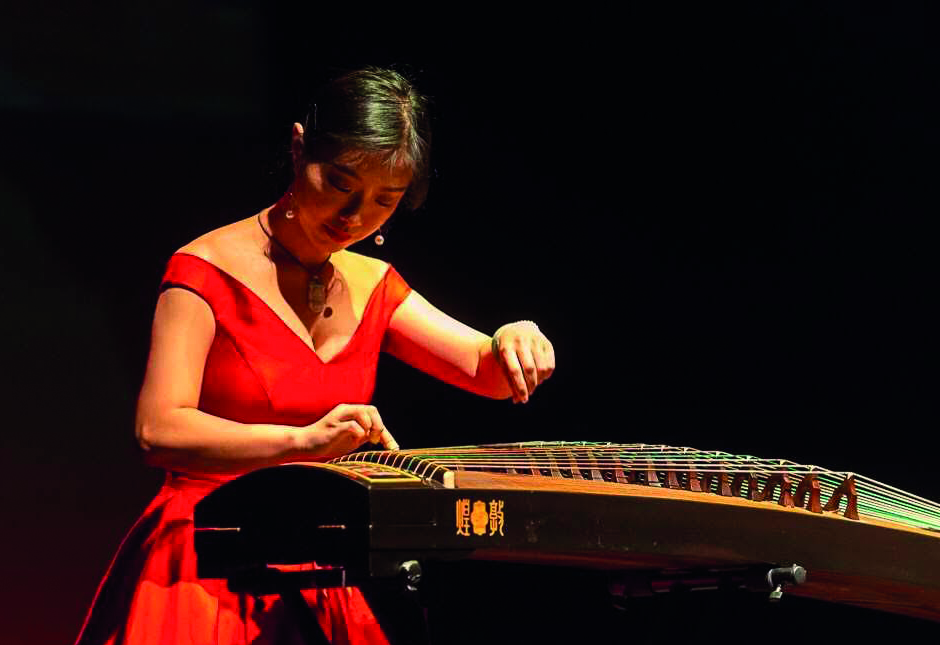I started playing piano when I was three. At five, I started with the guzheng (a 21-string plucked harp). Coming back from kindergarten, I first washed my hands, then spent an hour practicing piano and an hour on guzheng. Practice doubled during weekends. I also learnt dancing and painting, so I was a busy kid at that time.
When I think about my childhood in China, I am grateful. It was such a great environment to grow up in. My dad really is a cool and enlightened guy, even back at that time. So different from those ‘tiger parents’ or ‘helicopter parents.’ He would tell me when I was in school, “homework can be written at any time, but every concert is unique. If you miss it, you miss it.” When I am writing this sentence now, I still cannot stop smiling.
At that time, CDs and DVDs were not yet popular. I remember that there were many music tapes and videos at home, including both Chinese and western instrumental music, Chinese folk music, Chinese operas, and western operas. My mum also bought me a lot of story-telling tapes, such as Grimm’s Fairy Tales and Aesop’s Fables.
I lost count how many times I listened to them in my years from kindergarten to primary school. My brain captured not only the story line, but also the fantastic background music. When I think about the elves dancing scene from the fairy tale, Edvard Grieg’s “In the hall of the mountain king” is echoing in my mind. However, I had no idea about those masterpieces until the moment I learnt to play pieces by Chopin, Dvořák, Debussy, as well as many other composers on piano. These melodies were already in my childhood stories. Already in my mind.
“These melodies were in my childhood stories. Already in my mind.”
At 18 I left home to study in another city, and then in another country. In traditional Chinese families, parents always put their children in the most prominent position. It was also because of my parents’ love that I was not told about the death of both my grandfather (March 2010) and my grandmother (May 2020). My parents did not want me to worry or drop my study because of family affairs. Like most Chinese parents, they never mention what is going on at home if you are away from home. In the pandemic, this has happened more so than ever.
The weird thing was that I had a feeling something bad had happened to my grandmother around the time she was dying. I knew my family would not have told me even if something had happened. I texted my cousin to ask if our grandmother was alright. He did not respond to me very quickly, as he used to, which made me more suspicious. He did eventually reply to me but lied that our grandmother was ok. It was not until months later during a video chat with my mum that I realised my grandmother had passed. I was shocked and heartbroken. Not only for the loss of my grandmother but also for the loneliness of my mother. I sensed she had forever lost the identity she had in being her parents’ daughter. She told me during those months, she and my aunt would randomly jump on a bus and go through the city every day without purpose. Staring without interest at every shop window.

Xiaoxiao’s grandmother
As her daughter, I should be closest to her, but she chose to hide her heartbreak from me to try to protect me.
My memories of my grandmother are all of her loud voice and matching strong personality. My grandfather was a good-natured man who loved reading and telling stories for the children (my elder siblings and I). Grandmother was always in charge of family issues, no matter how big or small. She talked loudly, sounding as if in an argument. She raised me up and had a huge impact on my life. By contrast, to my eyes, my grandfather was meek and mild.
My grandmother had been living with dementia. Before coming to the UK, I had seen the process of her condition developing, how she was becoming weaker and weaker, smaller and smaller, and yes, she was extremely aggressive sometimes. Finally, she couldn’t recognise anybody, including herself. My mum was the main caregiver, and she worked 24/7, 365 days every year. Back then, I thought, the person suffering the most was not my grandmother. During this time, I discovered a fascinating thing – my grandmother suddenly started singing along to a song from the radio, and her mood and behaviour instantly changed. Oh my god. She had come back. I knew this song was one from her youth. This made me want to know more about the link between music and wellbeing. This has been the reason for my journey to the city of Liverpool and the University. The more I study, the more I am fascinated with this area.
I know that if I were to have dementia, I might feel frustrated and angry with myself when I can’t make sense of the world. I may also become angry or upset with others easily without any reason. Who is this person talking about? Where am I? What am I doing here? Awful feelings. Like being lost on an alien planet where I can’t read or understand anything or communicate with anybody. But ageing or living with dementia in a foreign country is really a double hazard. And I want to do something to help. There is growing awareness of the therapeutic value of creative arts for the ageing population and those with dementia, however, this hasn’t reached this migrant Chinese group.
“Living with dementia in a foreign country is a double hazard.”
Moving to a foreign country is a challenging process, and it is not only simply changing of physical locations, but a switch in social and psychological environments, values, practices, and cognition. We have to enter a process of re-construction, to find the self and to survive. I look back on my early time in the UK: there were, and there are, two nightmares for me: one is to read the menu in a restaurant, the other is to see the doctor in hospital. I can avoid the time to eat outside, or just point at the picture and say “I want this, big size.” But how can I avoid not to get sick. To get on with a new medical system is scary. It is not about just going to the hospital, pointing at the body part and saying “here, hurt, help.” So, music? Why bother?
But I want to mention about my PhD colleague, a sweet young British chap who spent a year or two in China. The cuisine is famous by its rich diversity. Even if you change one dish for each day, you won’t come across the same dish within two years. However, he needed some comfort food to make him feel attached and connected to home. So, while there he had to visit the Starbucks regularly, ordered a coffee and a hot tuna and egg sandwich (which is quite strange to British), and spend a half day there. It’s his comfort food, his stuff.
His experience makes me think, for some people, music is their comfort food, and even for some people from the Chinese community in the UK, music is their auditory hotpot or dumpling. Their identity, their attached. That something making them feel secure.
“Music is their hotpot. Their identity, their attached.”
I am at my third year of PhD at the University of Liverpool. It is about the impact of individualised music playlists upon people with dementia and their caregivers, specifically the potential outcomes on well-being and quality of life. Because of the pandemic, I modified the study to look at the culturally adapted and person-centred resource in dementia care for UK Chinese Diaspora.
I believe music can have a role in making many people’s life a less painful period. I am motivated to develop my PhD studies on the application of music in Eldercare and contribute to a future in which music could be a facilitator of a better quality of life for people in their late years.
During my kindergarten days music, was ALL about rhythms, tempos, notations, theories, and the skills needing to be conquered. But music is not only about techniques. It is part of the life for everybody. Music affects our mood, behaviours, and change our life in many ways. So, music? Why not.
